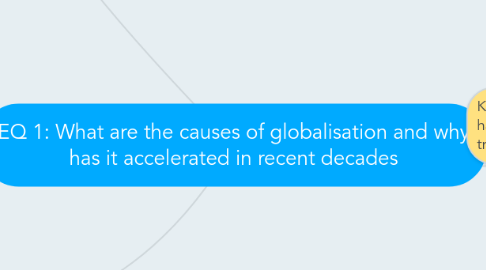
1. 3.2 Political and economic decision making are important factors in the acceleration of globalistion.
1.1. A: International, political and economic organisations i.e The role of the WTO, IMF and world bank. Have to the globalisation through the promotion of free trade polices and FDI
1.1.1. IMF will arrange loans from rich nations to poor nations, in return the nation receiving the loans must open up their domestic market to allow FDI and the integration of TNCs.
1.1.2. World Bank: lends money on a global scale often giving direct grants to developing nations which they can use in investing on infrastructure for example: $470 million was given to the Philippines for a poverty reduction program.
1.1.3. WTO: Arrange trade agreements and tariffs between nations. ask for countries to abandon protectionism attitudes. however the WTO has failed to stop MEDC from subsiding their down farm production as a result developing nations farmers are not paid fairly.
1.2. B:National governments are key players in terms of promoting free trade blocs such as the E.U and the ASEN and through polices such as free market liberation, privatization and encouraging business start-ups)
1.2.1. Free trades blocs encourages globalization by reducing trade barriers making trade of goods, people, information and capital more accessible to a wider group of people.
1.2.2. Theses polices encourage such as free market liberalization encourage FDI investment into a nation. bringing in people, culture, capital and investment. in addition reduced government spending and increases tax revenue.
1.3. C: SPEZs, goverment subsides and attitudes to FDI (china's open door policy 1978) have contributed to the spread of globalisation
1.3.1. SPEZ india, got TNCs to agree to FDI on their own terms unlike indonesia where they met with amercain and europen TNCs such as gap and levies and made the country a haven for the production of clothes however there are fears that workers are being expolited
2. Key Idea 3.3: Globalisation has affected some places and organisations more than others.
2.1. B:TNC are important in globalisation both to it's spread (GPN) and taking advantage of economic liberalization (outsourcing and offshoring)
2.1.1. GPN (Global Productions Network) a chain of connected supplier and manufacturers often to produce consumer goods, this network serves the need of the TNC.
2.1.2. Outsocuring: TNC contract a frim outside of their domestic operations to produced goods for them
2.1.3. Offshoring: Where TNC move their own production processes to other countries to cut their cost of operation.
2.2. C: There are physical, politcial, economic and enviromental reasons why some locations are largely switched off from globalistion
2.2.1. Sahel region house the least development nations of the world (LDCs) for example chad which is land locked, has a sparse population so theres no market potenital, as a result TNCs does not want to invest into the area , additonal when there is intrigraion it is small, such as providing raw materials for TNCs i,e cotton in malwai to TNCs. they are paid little as a result they have little spending power
3. Key Idea 3.1: Globalistion is a long standing process which has accelerated because of rapid developments in transport, communications and businessses
3.1. A. Globalistion involves widening and developing global connections, independence and flows
3.1.1. This can be done by the folllowing: Allowing free trade to encourage more trade between nations e.g EU
3.1.2. The resolvement of polication tensions
3.1.3. Opening up the local market to foreign investors and TNCs, allowing to bring technology, which interns boosts the domestic economy and quality of life.
3.2. B. Developments in transport and trade in the 19th century (railways, telegraph, steam-ships) accelerated in the 20th century (jet aircraft, containerization and the introduction to cyber communication)
3.2.1. This had lead to the time space compression due to the "shrinking world." This is where the advancements in technology and infrastructure has lead to the illusions that the earth has been strinking because there has been a major decrease in the time to transport goods and information across the global.
3.3. C: The 21st century has been dominated by rapid development in ICT and Mobile communication.
3.3.1. This has led to lower operational costs for firms i.e call centers in India and additional further contributed to time-space compression.

